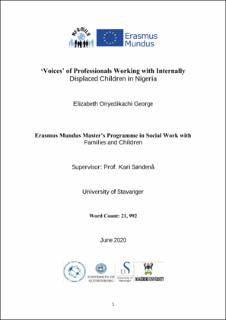| dc.description.abstract | Children are amongst those severely affected by internal displacement, accounting for more than 60% of people displaced from their homes and/or home regions due to insurgency and other crisis in Nigeria and the Lake Chad region. This exposes children to traumatic experiences and intense vulnerabilities which necessitate the intervention of professionals, like social workers, teachers, psychologists etc. However, little is known about the experiences of these professionals in Nigeria; thus, this study focused on exploring professionals’ lived experience of working with internally displaced children (IDC) in Nigeria, considering how they work to improve the lives of the children, the challenges they face in the process, and the opportunities and resources in working with IDC. Guided by the methodological framework of hermeneutic phenomenology, qualitative data was ethically collected from seven purposively-selected professionals using in-depth interviews, and analysed in themes. Results revealed that professionals work with a focus on what is best for IDC and what is best for them as professionals. They work holistically with IDC, considering their specific contexts and strengths/resources. They focus on empowering IDC, their caregivers and communities, using educational tools, and culturally-appropriate programmes designed in collaboration with the children and their networks. Results also showed that professionals are affected by challenges that accompany their work and challenges IDC face, such as child rights abuses brought on by reduced parental capacity and prevalent sociocultural norms, limited resources, institutional thresholds’ limitations etc., and thus employ different strategies to cope with the challenges. Supervision, work-life separation, professional trainings, family support, etc. serve not only as coping strategies but resources and motivating factors. Improvement in IDC’s lives and appreciation from them and their caregivers make working with them immensely rewarding. Some professionals also highlighted that their work is a divinely-mandated task, which will be rewarded by God. Recommendations from the study include standardising child welfare responses in Nigeria, improving efforts directed at education of IDC, developing educational curriculum focused on social work with displaced populations, and conducting further research on working with IDC in Nigeria, as this is the first study to explore this research area. | en_US |
